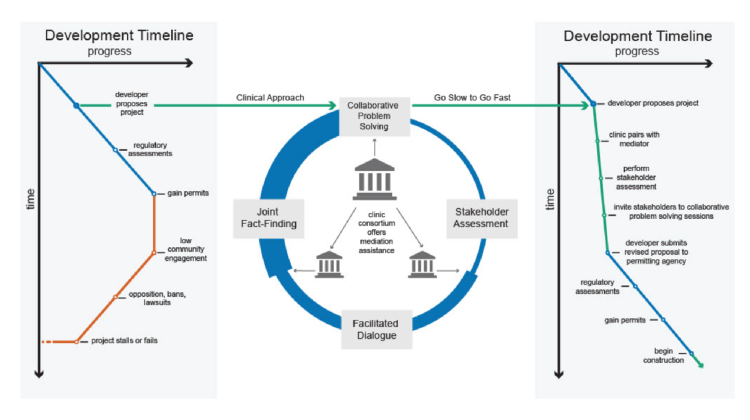Resolving Renewable Energy Facilities Siting Disputes

Go Slow to Go Fast: A Clinical Approach to Renewable Energy Facility Siting
Under the Biden administration, the United States has accelerated investment in the adoption of renewable and clean energy with hopes of achieving carbon emission benchmarks. Combined with political, policy, and financial support for the adoption of a cleaner energy grid, historical barriers such as technological limitations, affordability, and accessibility are being overcome. Yet local opposition to renewable energy facilities remains unresolved and is slowing down the deployment of a cleaner energy future. A team of researchers from MIT propose a national consortium of university-based clinics as a means to train students to better understand opposition to new facilities and minimize the conflicts that arise by utilizing joint fact-finding and collaborative problem-solving to adapt the process by which facilities are sited.
“Drawing on MIT’s “learning-by-doing” approach to education, the university clinic we aim to pilot will focus mainly on projects in our region. Similar clinics in other regions could offer the same kind of assistance in their area,” said Larry Susskind, Ford Professor of Urban and Environmental Planning and one of the architects behind the MIT Renewable Energy Clinic. “Eventually, a national consortium of university-based renewable energy facility siting clinics—sharing learning materials and experiences—could work jointly to scale up an Environmental Collaboration and Conflict Resolution (ECCR) framework for resolving siting disputes, maximizing the advantages the approach offers,” adds Jungwoo Chun, a lecturer with DUSP who is teaching the clinic this fall semester. The clinic is offered in both Fall and Spring semesters.
The team’s approach to tackling the difficulties of realizing the potential of renewable energy promises is detailed in their forthcoming paper in Cell Reports Sustainability, “A University-based Clinical Approach to Renewable Energy Facility Siting in the United States.”
Susskind’s research interests focus on the theory and practice of negotiation and dispute resolution, the practice of public engagement in local decision-making, cybersecurity for critical urban infrastructure, entrepreneurial negotiation, global environmental treaty-making, the resolution of science-intensive policy disputes, renewable energy policy, water equity in older American cities, climate change adaptation, socially-responsible real estate development and the land claims of Indigenous Peoples.
Chun is a graduate of the doctoral program at the MIT Department of Urban Studies and Planning (DUSP), holds a Ph.D. in Environmental Policy and Planning. He is passionate about improving pedagogical strategies and techniques, including ways of incorporating online learning tools, and combining them with in-person instruction. For a number of years, he has been a content developer and graduate instructor for online courses offered by MIT xPRO and edX/MITx, that have attracted more than 10,000 learners world-wide.
Additional members of the research team include: David Beron, Anushree Chaudhuri, and Sanjana Paul.


